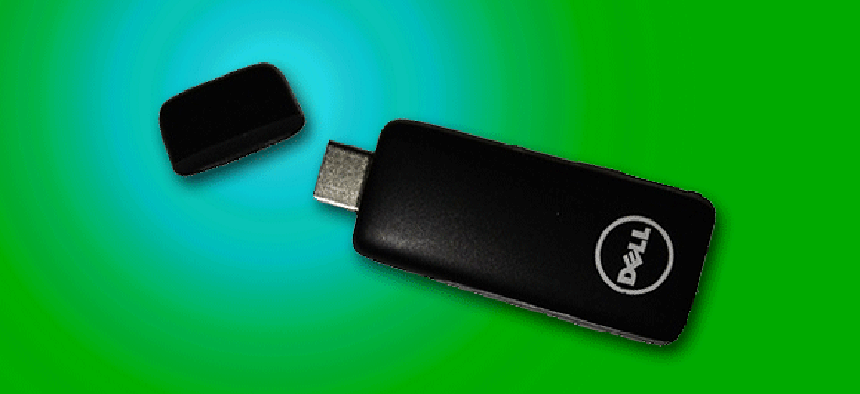Future of remote computing? Dell's Ophelia turns a TV into a thin client


Connecting state and local government leaders
The thin-client Cloud Key attaches to almost any monitor allowing remote users to access their work files without any data ever leaving the office network.
Imagine walking past a row of televisions at the mall showing sports highlights, and suddenly remembering something you forgot to do back at work. You plug in a cigarette lighter-sized device into any of them, and suddenly, instead of showing basketball highlights, your commandeered monitor has access to your entire desktop back at the office.
Grab a keyboard and mouse, and you can check e-mail, surf the Internet and finish up the last page of an important PowerPoint presentation. Then when you remove the device, the TV immediately goes back to displaying the sports channel as if you were never even there. Best of all, no agency data ever leaves the computer in the office.
It sounds bit like science fiction, but that’s the idea behind Dell’s new Project Ophelia thin client device, which will soon be on sale for less than $100.
Jeff McNaught, executive director of marketing and chief strategy officer for Dell Cloud Client Computing, explained how Ophelia, which Dell is also calling a Cloud Key, works. “It will connect to any HDMI port, meaning there are over 250 million displays that work with the Cloud Key right now,” he said. “It gets power from the display, and then uses Wi-Fi and Bluetooth to connect to your external devices, like a keyboard or mouse.”
In terms of hardware, the Cloud Key is unique in that it’s designed to plug into an HDMI port. McNaught said a USB-based key is in the works as well, but the first units will be all HDMI. Still, the back of Ophelia has two USB ports, so devices can be attached the old fashioned way too, leaving nothing to chance.
Everything the key needs in terms of software, it can acquire in the cloud.
The devices can grant network access to systems running any support software, including that from Microsoft, Citrix or VMware. Or an Ophelia can create a virtual private network tunnel to an individual user’s desktop computer back at the office, should it be configured to do that.
The keys themselves support full, rich sound and are able to connect to external speakers or headphones. They are also able to display full HD video, so quality isn’t lost just because a user is connecting to the network using a Cloud Key.
For IT administrators, every Ophelia key within an office can be managed through the Dell Wyse Cloud Client Manager Software, which will be distributed as a free service to users of the Ophelia devices. The admin software will allow complete control over what types of applications the cloud keys can run and will also enable real-time monitoring of Ophelia users and locations.
In terms of security, the Ophelia devices are completely stateless. No data from either a current session or previous ones are stored locally. If a Cloud Key is ever lost or stolen, no data can be recovered from it. Also, admins can lock out a lost, stolen or even a forgotten Ophelia (if someone leaves it in a monitor at the local electronics store) so that it can’t ever be used again.
Reports on usage and policy compliance also can be triggered. For users, there’s a section of the software where they can manage their individual keys, too. And of course, logging into any Cloud Key requires a lock-type numerical password in addition to whatever is needed to gain access to a network.
McNaught said that because half of Dell Wyse’s current business consists of public-sector organizations and government, Ophelia was created to address needs in those markets. Specifically, he said that clients had made five major requests of Dell, which were the impetus for Ophelia.
- Government wants to reduce clutter at the worksite, eliminating cables and reducing the footprint computers take up for employees.
- Educational organizations in particular are trying to reduce costs and still provide a one-student-to-one-computer ratio.
- Airports were looking for a small device to drive their digital signage.
- Government agencies of all types were looking for inexpensive computers that could be transported securely without the risk of data being lost or stolen.
- Communication companies wanted a way to provide Internet access to their customers without the need for a full computer.
It all came together in Ophelia.
Incidentally, Ophelia is just a code word used by Dell and its subsidiary Wyse while making the device. When it goes on sale during the first half of this year — the exact date has yet to be decided — it will be called something else, perhaps even the more generic Cloud Key. The price has yet to be officially determined either, though McNaught said that it will be “well under $100.”




